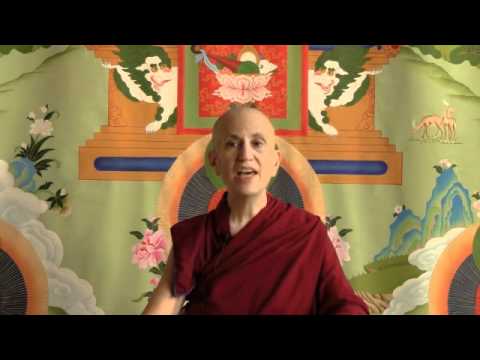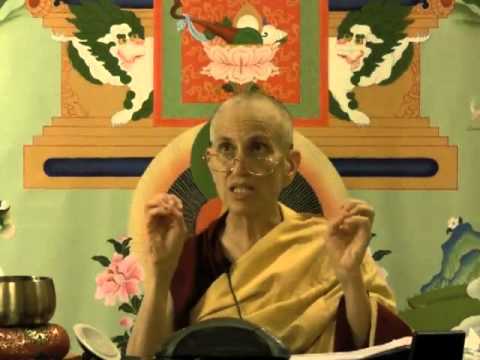Immeasurable love
This talk was given during the White Tara Winter Retreat at Sravasti Abbey.
- What love is and how it is different from attachment
- What to meditate on to develop immeasurable love
White Tara Retreat 12: Immeasurable love (download)
With the four immeasurables, the first one was love. Remember? “May all sentient beings have happiness and its causes.” Lama Yeshe used to tease us saying—well, tease, not tease, joking, not joking—that when we say that we love someone what we really mean is that we want something from them. If we look and if we’re honest, that’s very often the truth.
We want something from somebody. We might want emotional comfort. We might want support. We might want help. We might want material things. We might want approval. There are so many things we might want from somebody. Yes. Sex. Pleasure. But often when we say, “I love you,” the sub-line is, “I want something from you.” That’s because our love is very conditional.
What we call love, in many ways, is attachment based on exaggerating the good qualities of someone or something, and clinging to them. Or exaggerating the kind of relationship we have with somebody and clinging to that. Therefore, we treasure that person more than others, thinking that they are more wonderful, more important, etc., etc. Their happiness is more important than anybody else’s, except of course, ours—because we are number one.
You can see it’s based on a distorted way of looking at somebody. It can be very fickle because we love somebody when we’re getting from them what we want, and when they don’t give us what we want, then we very quickly hate them. That’s why you’ll see that the relationships that we have the strongest emotions about are the people we love, because we flip over and hate them very easily. When you look at it it’s true, isn’t it? Who are the people you get the angriest at? The people that you’re most attached to, that you say you love the most. Why are you angry? Because they’re not doing what you want. And they should! Right? They should do what we want, and give us what we want, and be what we want. In return they get our love. When they don’t do that, then we get so upset. We become really like an emotional yoyo, and very unpredictable to the other person. We can see from our side that our caring for them is very conditional. It’s not pure caring. It’s not, “I care about you because you exist.” We want people to have that feeling about us, don’t we? More than anything what we want is unconditional love. We don’t want people to reject us, to abandon us, to discriminate against us. We want them unconditionally to support us and think we’re worthwhile.
Do we give that kind of support and emotional feeling to others? No. It’s very conditional. Having this kind of conditional love for others not only creates problems for them, but it creates so many problems for us. It becomes so difficult for us to accept others as they are, because the foremost condition is they should be, do, have what I want them to be, do, and have. When they aren’t then we get revved up and we get very unhappy.
In Buddhism what we’re trying to do is see that everybody equally wants to be happy and equally wants to be free of suffering. From that point of view, wishing others happiness and the causes of happiness (which is the definition of love) is worthy to every being. Love can be extended to every being simply because they exist, they want to be happy, and they don’t want to suffer.
Furthermore they’ve all been kind to us, if not in this life then in previous lives. So there are definitely reasons to care for others—including the fact that we wouldn’t be alive without others doing what they do in society.
So there are plenty of reasons for us to care for them in an equal way, which makes our mind calmer, and makes our relationships with others better. Why? We’re not being so demanding of them, or having so many expectations of them. Then it becomes just much easier to accept them and to love them for who they happen to be at that particular moment.
Loving everybody in an equal way does not mean we act the same regarding everybody. It’s clear that we have different kinds of social relationships with different people, and different social expectations and social roles. We have to adapt to that social role. For example, we might equally feel that the people we know and the people we don’t know are worthy of happiness and its causes, but it doesn’t mean that we invite everybody that we don’t know into our home. That’s not necessarily wise.
We still act according to the situation regarding different people, but in our heart, there can be the wish for everybody equally to have happiness and its causes. That’s what we’re aiming for. It’s very difficult to get there. As much as we can, work on the meditations: first of all seeing the defects of attachment. Second, really imbuing in our mind that everybody wants happiness and doesn’t want to suffer equally. And third, thinking about the kindness that we’ve received from others including just what they’ve done in society, and include kindness that they’ve shown us in previous lives and will show us in future lives—include that in.
If we can think about those points again and again, that will help even our mind out and really open our heart towards wanting everybody to have happiness and its causes. That, in turn, will lead to many good results for ourselves including more mental and emotional peace and a much more caring and loving heart. Then we don’t feel so ill at ease or suspicious around others, but instead will be able to look at others no matter who they are and just see, “Oh, here’s somebody who wants to have happiness and doesn’t want to suffer and who’s been kind to me.” If we can look at others in that way, then, I mean, imagine how wonderful we would feel from our side. Wouldn’t that be nice instead of always looking at people, “Huuuh, I wish they’d be like that, and they’re not like that. When are they going to meet my agenda and my criteria?” That’s just a nuisance in our own mind.
Okay, so this takes a lot of reflection, a lot of meditation, a lot of effort on our part. But as much as we can inch our mind in the direction of equal-hearted love for others then that much more we’ll benefit and they’ll benefit.
Venerable Thubten Chodron
Venerable Chodron emphasizes the practical application of Buddha’s teachings in our daily lives and is especially skilled at explaining them in ways easily understood and practiced by Westerners. She is well known for her warm, humorous, and lucid teachings. She was ordained as a Buddhist nun in 1977 by Kyabje Ling Rinpoche in Dharamsala, India, and in 1986 she received bhikshuni (full) ordination in Taiwan. Read her full bio.


